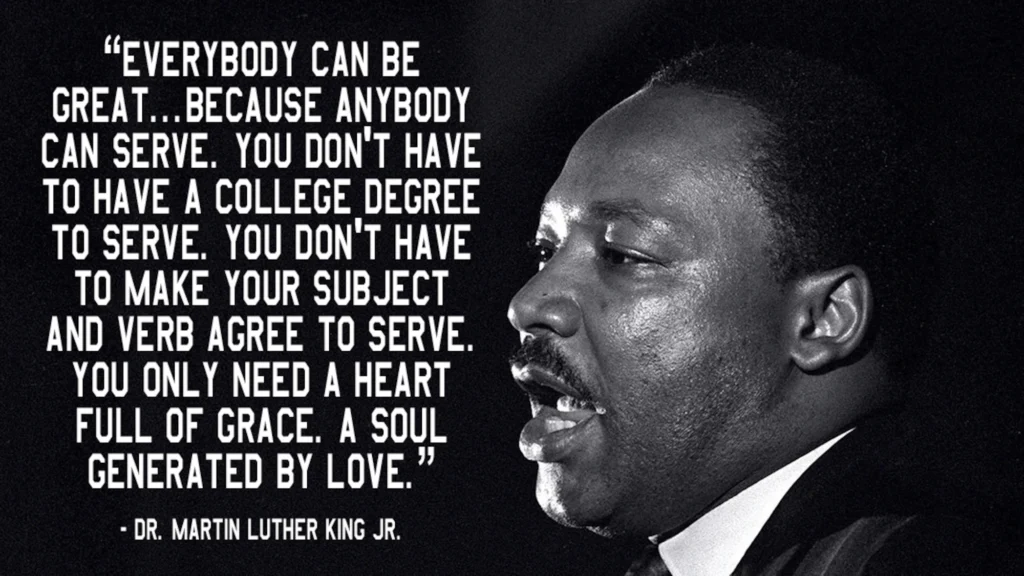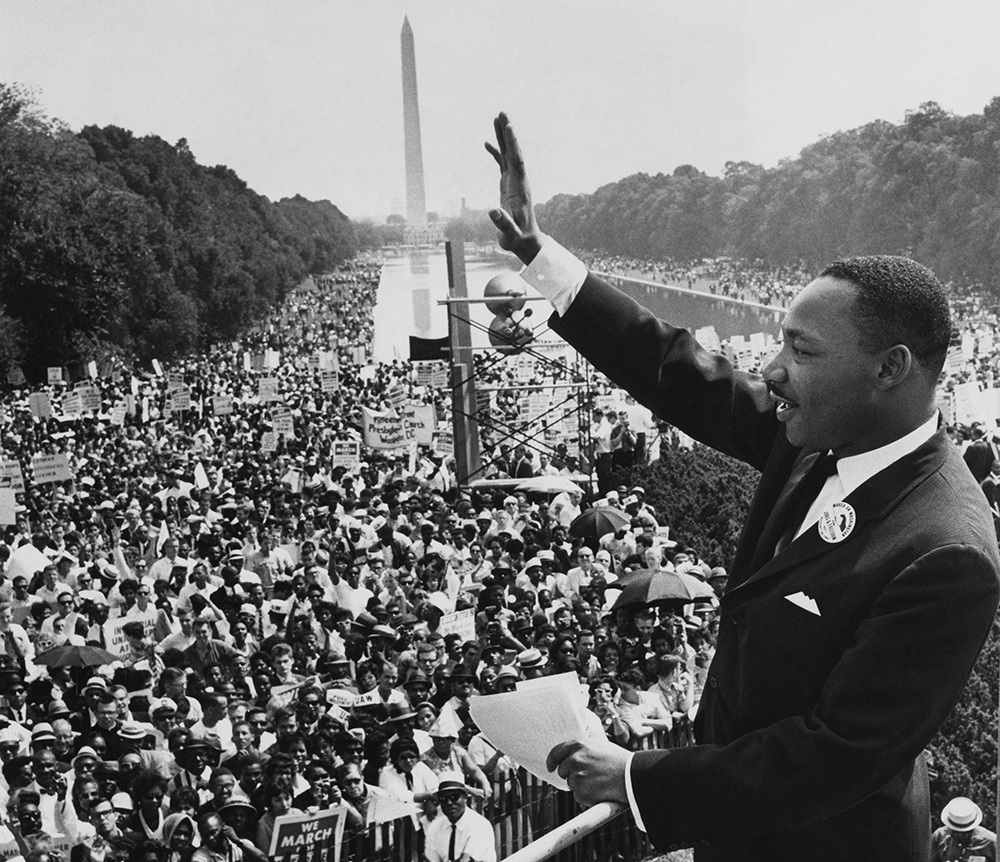By CHAZ PLAGER
Today, January 16, is a national holiday— specifically, a national holiday celebrating Martin Luther King Jr., a champion of the civil rights movement and for black equality. (MLK Holiday is observed on the third Monday of January.)
King was born January 15, 1929, in Atlanta, Georgia.
Named Martin after his father, King was inspired by the way his father preached to the masses at church, leading to him becoming interested in debate and public speeches at a young age.
In his junior year at high school in 1944, King won a public contest where he spoke about black rights and oppression, stating “The finest negro is at the mercy of the meanest white man.”
King, and his teacher Sarah Grace Bradley, was forced to stand up for several hours on the ride bus home from the contest so that a white man could take his seat.
That night sparked a righteous indignation that followed him into his years at Morehouse College. King graduated with a bachelor’s degree in sociology. He earned his divinity degree in 1951 from Crozier Theological Seminary and his Doctor of Philosophy from Boston University in 1955.
King preached at Ebenezer Baptist Church in Atlanta. After becoming acquainted with the NAACP (National American Association for Colored Peoples), King began to become bolder with his protests, notably leading the 1955 Montgomery protests.
King quickly became a figure of importance in the group due to his nonviolent ideals inspired by Indian activist Gandhi, who he called “a guiding light.” Even if they were hit, King asserted that they should not strike back.
He was frequently arrested and imprisoned, but never gave up, nor fought back. He, like Mahatma Gandhi, fought injustice with love, respect and non-violent protest.
King founded the Southern Christian Leadership Conference (SCLC) in 1957.
The F.B.I. had begun watching King in December 1955. F.B.I. Director J. Edgar Hoover thought he was a communist and monitored him continuously. Surveillance produced alleged evidence of marital affairs – but nothing linking King to communism.
According to Stanford University, Hoover deployed agents to find subversive material on King, and Robert Kennedy authorized wiretaps on King’s home and Southern Christian Leadership Conference (SCLC) offices in October 1963.
According to the Senate Select Committee, the FBI anonymously sent King a compromising tape recording of him carousing in a Washington, D.C., hotel room, along with an anonymous letter that SCLC staff interpreted as encouraging King to commit suicide to avoid public embarrassment.
On August 28, 1963, King collaborated with other activist leaders to begin the famous March on Washington, where he gave perhaps one of the most well-known speeches of all time, “I Have a Dream,” from the steps of the Lincoln Memorial.
This was the push needed for President Lyndon B. Johnson to pass the Civil Rights Act, ending segregation, and allowing black people significantly more freedom.
King, 35, was awarded the Nobel Prize for Peace in 1964, at that time, he was the youngest person to have done so.
In a 1964 Press Conference, Hoover said that King was the “most notorious liar in the country.” To which King said he could only have sympathy for Hoover as he must be “under extreme pressure” to make such a statement.
In the last few months of King’s life, the FBI intensified its efforts to discredit him and to “neutralize” SCLC, according to a Senate Select Committee.
On April 4, 1968, after a speech, King was fatally shot by James Earl Ray Jr., on the balcony of the Lorraine Motel. In his speech, King prophetically had said “Like anybody, I would like to live a long life. Longevity has its place. But I’m not concerned about that now. I just want to do God’s will.”
Almost immediately after his death, Representative John Conyers made a motion to make King’s birthday a federal holiday. In 1969, black unions began to support the idea of a federal holiday.
The original motion failed, and it would be 11 years before the motion once again went before the House of Representatives. This time it fell five votes short, despite support from Congress and President Jimmy Carter.
The house voted again in 1983 and it passed. It went to the Senate, and Democrats Tip O’Neill and Jim Wright, and republicans Jack Kemp and Newt Gingrich gave speeches to support the federal holiday.
Senator Jesse Helms (North Carolina) opposed it and introduced a file that called King a communist. Despite Helms’ efforts, it passed the Senate by 12 votes. President Ronald Reagan signed the bill in November 1983. The first observance was held in 1986 with 17 states adopting the holiday.
Voters in Arizona were asked to approve the holiday by referendum in 1990. The National Football League threatened to move the 1993 Super Bowl from Tempe if the holiday was not approved.
The referendum failed, the NFL moved the game to Southern California, costing Arizona an estimated $500 million in revenue. Two years later Arizona approved the holiday.
South Carolina was one of the last states to approve a paid King Holiday and by 2000, all 50 states had made it a state government holiday.
We celebrate his life and contributions every year, and as we see white and black Americans stand side by side, we are compelled to think of his dream: “I have a dream that one day… one day right down in Alabama little Black boys and Black girls will be able to join hands with little white boys and white girls as sisters and brothers. . . .
“And when this happens, and when we allow freedom to ring, when we let it ring form every village and every hamlet, from every state and city, we will be able to speed up the that day when all of God’s children, Black men and white men, Jews and Gentiles, Protestants and Catholics, will be able to join hands and sing in the words of the old spiritual: Free at last, Free at last. Thank God almighty, we are free at last.”



Well written piece! I learned a lot just now in a 3 minute read which speaks volumes to the author! Thank you for this, Chaz.
What a wonderful article! Very thorough and enlightening. It is a fitting tribute to a great man